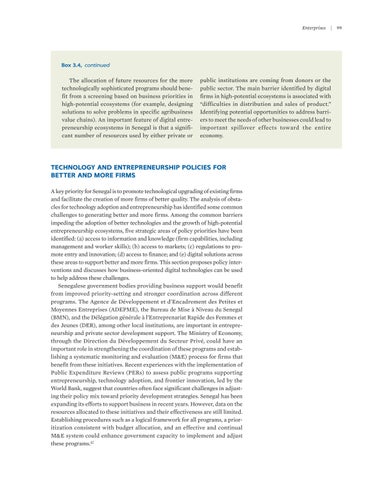Enterprises
|
Box 3.4, continued
The allocation of future resources for the more technologically sophisticated programs should benefit from a screening based on business priorities in high-potential ecosystems (for example, designing solutions to solve problems in specific agribusiness value chains). An important feature of digital entrepreneurship ecosystems in Senegal is that a significant number of resources used by either private or
public institutions are coming from donors or the public sector. The main barrier identified by digital firms in high-potential ecosystems is associated with “difficulties in distribution and sales of product.” Identifying potential opportunities to address barriers to meet the needs of other businesses could lead to important spillover effects toward the entire economy.
TECHNOLOGY AND ENTREPRENEURSHIP POLICIES FOR BETTER AND MORE FIRMS A key priority for Senegal is to promote technological upgrading of existing firms and facilitate the creation of more firms of better quality. The analysis of obstacles for technology adoption and entrepreneurship has identified some common challenges to generating better and more firms. Among the common barriers impeding the adoption of better technologies and the growth of high-potential entrepreneurship ecosystems, five strategic areas of policy priorities have been identified: (a) access to information and knowledge (firm capabilities, including management and worker skills); (b) access to markets; (c) regulations to promote entry and innovation; (d) access to finance; and (e) digital solutions across these areas to support better and more firms. This section proposes policy interventions and discusses how business-oriented digital technologies can be used to help address these challenges. Senegalese government bodies providing business support would benefit from improved priority-setting and stronger coordination across different programs. The Agence de Développement et d’Encadrement des Petites et Moyennes Entreprises (ADEPME), the Bureau de Mise à Niveau du Senegal (BMN), and the Délégation générale à l’Entreprenariat Rapide des Femmes et des Jeunes (DER), among other local institutions, are important in entrepreneurship and private sector development support. The Ministry of Economy, through the Direction du Développement du Secteur Privé, could have an important role in strengthening the coordination of these programs and establishing a systematic monitoring and evaluation (M&E) process for firms that benefit from these initiatives. Recent experiences with the implementation of Public Expenditure Reviews (PERs) to assess public programs supporting entrepreneurship, technology adoption, and frontier innovation, led by the World Bank, suggest that countries often face significant challenges in adjusting their policy mix toward priority development strategies. Senegal has been expanding its efforts to support business in recent years. However, data on the resources allocated to these initiatives and their effectiveness are still limited. Establishing procedures such as a logical framework for all programs, a prioritization consistent with budget allocation, and an effective and continual M&E system could enhance government capacity to implement and adjust these programs.37
99



